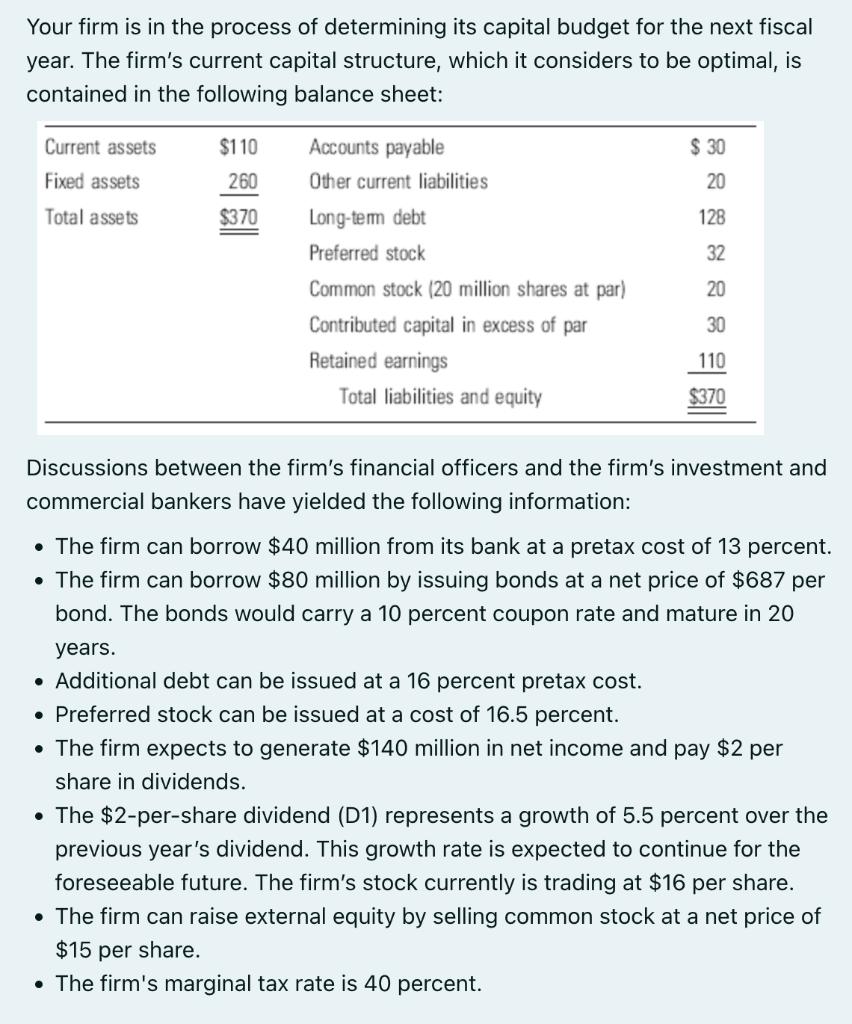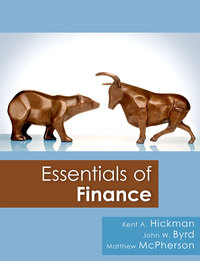Question
1) What is the firm's WMCC if it raises less than 100 million in total funds? You may use the book values in the balance

1)
What is the firm's WMCC if it raises less than 100 million in total funds? You may use the book values in the balance sheet to calculate weights. Note that short-term debt (accounts payable and CL) do not go into capital structure, so you only need long-term debt to calculate debt's weight. Provide your answer in percent form without the % sign.
Hint: Use only long-term debt for the value of debt; preferred stock for preferred stock; common stock, contributed capital, and retained earnings for equity.
2)
We have just solved for the WMCC (WACC) for the first increment of the WMCC curve. Using the same information as in the question above, identify the WMCC (WACC) for the second increment.
3)
At what total budget does the WMCC go up again? (Hint: We've calculated the starting level of the WMCC and the level after that, now identify the point at which the WMCC rises again). 4)
What is the WMCC for this third increment?
5)
What is the dollar amount at the final breakpoint (increment)?
6)
Finally, what is the WMCC for all funds beyond this level?
Your firm is in the process of determining its capital budget for the next fiscal year. The firm's current capital structure, which it considers to be optimal, is contained in the following balance sheet: Current assets $ 30 $110 260 Fixed assets 20 Total assets $370 128 32 Accounts payable Other current liabilities Long-term debt Preferred stock Common stock (20 million shares at par) Contributed capital in excess of par Retained earnings Total liabilities and equity 20 30 110 $370 Discussions between the firm's financial officers and the firm's investment and commercial bankers have yielded the following information: The firm can borrow $40 million from its bank at a pretax cost of 13 percent. The firm can borrow $ 80 million by issuing bonds at a net price of $687 per bond. The bonds would carry a 10 percent coupon rate and mature in 20 years. Additional debt can be issued at a 16 percent pretax cost. Preferred stock can be issued at a cost of 16.5 percent. The firm expects to generate $140 million in net income and pay $2 per share in dividends. The $2-per-share dividend (D1) represents a growth of 5.5 percent over the previous year's dividend. This growth rate is expected to continue for the foreseeable future. The firm's stock currently is trading at $16 per share. The firm can raise external equity by selling common stock at a net price of $15 per share. The firm's marginal tax rate is 40 percent. Your firm is in the process of determining its capital budget for the next fiscal year. The firm's current capital structure, which it considers to be optimal, is contained in the following balance sheet: Current assets $ 30 $110 260 Fixed assets 20 Total assets $370 128 32 Accounts payable Other current liabilities Long-term debt Preferred stock Common stock (20 million shares at par) Contributed capital in excess of par Retained earnings Total liabilities and equity 20 30 110 $370 Discussions between the firm's financial officers and the firm's investment and commercial bankers have yielded the following information: The firm can borrow $40 million from its bank at a pretax cost of 13 percent. The firm can borrow $ 80 million by issuing bonds at a net price of $687 per bond. The bonds would carry a 10 percent coupon rate and mature in 20 years. Additional debt can be issued at a 16 percent pretax cost. Preferred stock can be issued at a cost of 16.5 percent. The firm expects to generate $140 million in net income and pay $2 per share in dividends. The $2-per-share dividend (D1) represents a growth of 5.5 percent over the previous year's dividend. This growth rate is expected to continue for the foreseeable future. The firm's stock currently is trading at $16 per share. The firm can raise external equity by selling common stock at a net price of $15 per share. The firm's marginal tax rate is 40 percentStep by Step Solution
There are 3 Steps involved in it
Step: 1

Get Instant Access to Expert-Tailored Solutions
See step-by-step solutions with expert insights and AI powered tools for academic success
Step: 2

Step: 3

Ace Your Homework with AI
Get the answers you need in no time with our AI-driven, step-by-step assistance
Get Started


